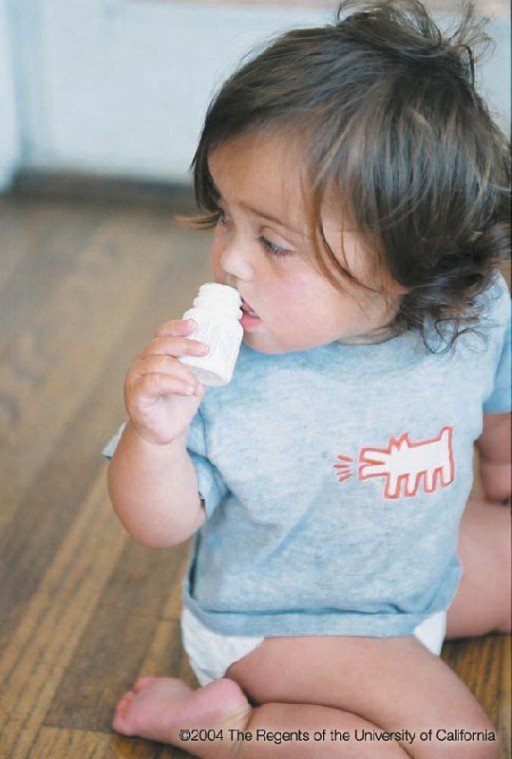Little pitchers have big ears, or so the saying goes. But they
also have big eyes yearning to explore the world around them. Eyes
lead to hands that put things in little mouths, sometimes things
that don’t belong.
Little pitchers have big ears, or so the saying goes. But they also have big eyes yearning to explore the world around them. Eyes lead to hands that put things in little mouths, sometimes things that don’t belong.
Children ages zero to five are at the greatest risk for accidental poisoning, but exercising some common sense around the house could easily prevent many of the more than 300,000 calls directed to Poison Control each year.
Medication, household chemicals, personal products and even detergents can look appealing to children, especially those who are too young to read labels.
“It’s important not to confuse small children,” said Iana Simionov, director of program development for California’s Poison Control, whose crisis hotline handles 800 to 900 calls per day. “A lot of things look alike, so it’s really important not to send mixed messages like storing cleaning supplies in with food or pouring bleach into a cup to take out to the wash room.”
Most accidental poisonings result in no more than a yucky taste or an upset stomach, but it’s important to be sure.
Callers are questioned by the doctors and nurses who staff the line, directed in what to do, and even routed to the nearest hospital if the problem is indeed serious.
Poison control employees even call the hospital to brief doctors and nurses there on the status of their incoming patient.
The system, which has faced serious threats to its $6.9 million budget in the last two years, is funded by the state of California through June 30.
Gov. Arnold Schwarzenegger and the state senate must then decide whether to renew the organization’s funding in the upcoming state budget.
Poison Control saves the Golden State $55 million per year in emergency care, according to Simionov and nationally the program has a cost to benefit ratio of seven to one, not that the program’s bottom line matters to many of the hundreds of frightened caregivers who call the group’s toll-free line each day.
To prevent just such occurrences, take a few extra precautions. Aside from common things like installing cabinet locks and asking for child-resistant caps at the pharmacy, there are a few other safety tips that can help to make a home kid-friendly:
n Don’t ever call medicine or vitamins candy. It may make them a bit easier to have kids swallow, but the perception that they can be eaten like sugary foodstuffs encourages little fingers to find things like Grandma’s blood pressure medication.
“You should not take medication or vitamins in front of children, either,” said Simionov. “They love to imitate adults. It’s a natural part of learning.”
n Do not leave cleaning solutions, detergents or pesticides out in the open for any period of time while children are present, said Gilroy Pediatrician Dr. K.K. Bahtia.
“Detergents and elderly people’s medications are the two problems I’ve seen most,’ said Bahtia.
If stowing such items in appropriate cabinets isn’t an option, take them with you, advised Simionov.
n Label household plants, either by taping a label bearing their scientific name to the underside of the pot or by writing it in there in permanent marker.
“It’s a lot better than calling us and only being able to say they ate something green,” said Simionov.
n Have a plan. Post Poison Control’s telephone number (located at the bottom of this article) near the phone along with other critical information.
Make sure anyone responsible for the child’s care has a copy of basic child safety procedures from Poison Control or the American Academy of Pediatrics, and make sure they read it.
Moms and dads may be in the know, said Bahtia, but friends or relatives without children may have softened their standards.
She advises photocopying materials on household safety for anyone a parent would consider leaving their child with, and finding out how many of the things on the list are actually in place before the child arrives.
Whatever happens, just remember that children are bound to find trouble no matter how well they’re watched, and whether or not you intend it for them.
“Kids stick things in their mouths,” said Simionov. “That doesn’t mean that anyone is a bad parent. Most of the time someone is watching the child, but it happens most often when a product is in use.”
“They (the parents) might get distracted for a few minutes – suddenly the phone is ringing or there’s someone at the door – and things can happen.”
If you suspect your child or any child in your care has ingested or been hazardously exposed to toxins, call Poison Control immediately at (800) 222-1222. For more information, including free information kits and refrigerator magnets, visit their Web site at www.CalPoison.org.















